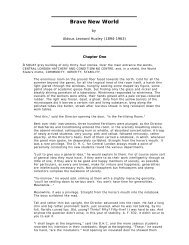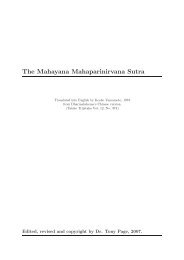Aphoristic Writings, Notebook, and Letters to a Friend, by Otto ...
Aphoristic Writings, Notebook, and Letters to a Friend, by Otto ...
Aphoristic Writings, Notebook, and Letters to a Friend, by Otto ...
Create successful ePaper yourself
Turn your PDF publications into a flip-book with our unique Google optimized e-Paper software.
The other possibility is that the person falls in<strong>to</strong> Nothingness; he dissolves in<strong>to</strong><br />
nothing but material a<strong>to</strong>ms: the absolute criminal. The preparations for this mental<br />
disintegration have already been made <strong>by</strong> the criminal over the course of his life. Hell<br />
is the good person’s fear of evil, for fire is the agent <strong>to</strong> expel <strong>and</strong> vaporise that which<br />
has been formed. But there is no hell: the good person creates himself, the evil one<br />
destroys himself.<br />
––––––––––––<br />
A person physically comes in<strong>to</strong> existence through father <strong>and</strong> mother, spiritually<br />
through the dem<strong>and</strong> of Something, of the Absolute, for Nothingness. Myth of Uranus<br />
<strong>and</strong> Gaia. To this extent we are children of God <strong>and</strong> sons of dust (matter) at the same<br />
time. Man can also spiritually take after the father or the mother: after the father, in<br />
that he becomes God, after the mother, in that he mentally goes <strong>to</strong> ruin. Thus, man<br />
comes <strong>to</strong> be through a higher sort of inheritance than the animals; he returns <strong>to</strong> the<br />
father if he denies original sin, he submerges himself in the seclusion of the mother’s<br />
lap if he affirms it.<br />
––––––––––––<br />
Is epilepsy not the loneliness of the criminal? Does he not fall because he has<br />
nothing more he can hold on <strong>to</strong>?<br />
––––––––––––<br />
One can recognize from the following how much a mental phenomenon differs<br />
from a physical one. Suppose it were established that an immoral impulse was always<br />
associated with a certain bodily movement, a certain feeling in the heart, <strong>and</strong> a moral<br />
impulse always connected with another gesture, another bodily sensation, <strong>and</strong> the type<br />
<strong>and</strong> localization of these accompanying physical symp<strong>to</strong>ms were known quite<br />
precisely <strong>to</strong> science or a particular person, <strong>and</strong> he could recognize them. It would thus<br />
be absolutely, <strong>to</strong> the very highest degree unmoral, if this person wanted <strong>to</strong> use the<br />
accompanying sensations as a st<strong>and</strong>ard <strong>by</strong> which <strong>to</strong> judge whether his mental<br />
impulses were moral or not.<br />
Here lies the real difference between the mental <strong>and</strong> the physical. The mental must<br />
be more immediately known than the physical – that is a dem<strong>and</strong> of ethics. We have<br />
even yet another measuring st<strong>and</strong>ard <strong>and</strong> organ of perception <strong>and</strong> judgement for that<br />
which we do, think <strong>and</strong> feel ourselves, than for external phenomena. And that is why<br />
simple introspection can yield true results: philosophy <strong>and</strong> art are nothing but<br />
different modes of a deepened introspection.<br />
12







